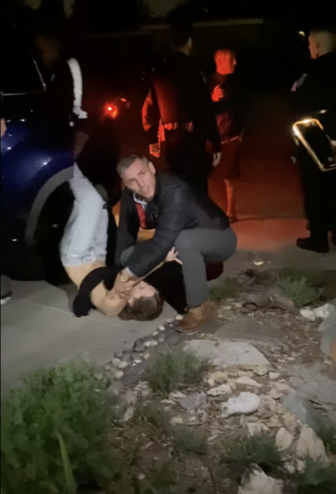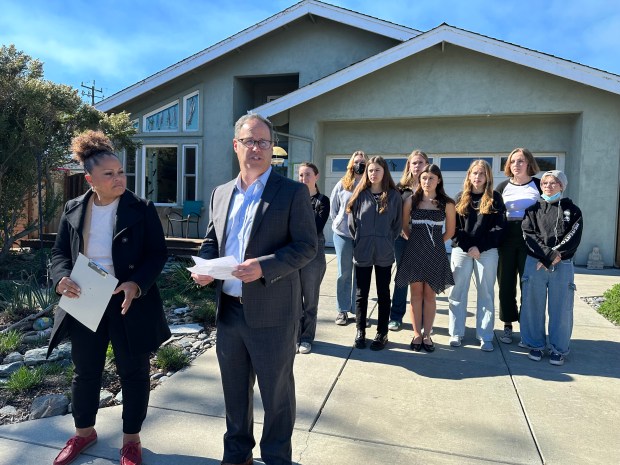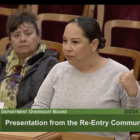This article is adapted from an episode of our podcast “Civic.” It is the fourth in a series about the way family courts adjudicate cases involving domestic abuse and child abuse. Click the audio player below to hear the full story.
A video showing the violent removal of two children from a Santa Cruz home has spurred calls to ban a controversial practice that pressures children to recant claims of abuse and embrace their alleged abuser.
As previously reported by the San Francisco Public Press, Maya Laing, 15, and Sebastian Laing, 11, were removed from their father’s custody in October after a family court judge ruled that the children lied — at their father’s behest — when they alleged their mother sexually abused them. The judge ordered that the children be taken to a reunification program in Los Angeles. Proponents say that reunification camps are necessary to “deprogram” a child from the preferred parent’s brainwashing that made them believe they were abused by the other parent.
Traumatizing transport
The process begins by transporting the child to the camp, which is typically away from their hometown or even out of state, according to Tina Swithin, who is fighting to ban reunification camps.
“I’ve heard stories of children being taken off of school buses on their way home by these transport agents,” Swithin said.
Transport agents are hired to take children away, and they are not deterred by unwillingness, as witnessed in the case of Maya and Sebastian Laing. The agents in this case work for a company called Assisted Intervention Inc. Protesters and elected officials said they were disturbed by the level of violence shown in an Oct. 20, 2022, video of transporters grabbing the children and forcing them into an awaiting car. Assisted Intervention representatives declined an interview request. An email response from the company called the situation “complex” and stated that the video “showed an incomplete picture of the events.”
Catherine Barrett, a licensed clinical forensic psychologist based in Los Angeles, said the incident amounts to kidnapping. She likened it to police arrest, which is even traumatic to adults she has treated.
“You know, forcing arms, necks bent, that power and control and losing their autonomy and their sense of self-empowerment in that moment,” Barrett said. “What that type of kidnapping, interrogation, arrest, what that does to a child long term — how they believe that builds trust, how they believe that can rebuild a relationship to me is so astounding. It’s so abusive. It’s criminal.”
Politicians react
The transporters who took the Laing children were authorized “to physically take possession” of them under the order of Santa Cruz County Superior Court Judge Rebecca Connolly, said Santa Cruz Police Deputy Chief Jon Bush.

Courtesy of Tina Swithin
A transporter from Assisted Interventions Inc. forces Maya Laing into a vehicle in Santa Cruz on Oct. 20, 2022, while police officers and witnesses stand by, as depicted in this still image from a video of the episode that was shared on social media.But after the video went viral on social media, local elected officials acted to change that authority. Less than a month after the video’s release, Santa Cruz County supervisors unanimously passed a resolution amending the County Code to impose a no touch policy on youth transport agencies, aligning them with county rules governing social services agencies. The supervisors also urged California’s elected officials to regulate youth transport companies and reunification camps, which do not require a license to operate, unlike the state’s childcare and health care centers and schools. Richard Stapler, the chief of staff for State Sen. John Laird, whose district includes Santa Cruz County, wrote in an email that his office is looking at potential legislative proposals.
“We are very early in the legislative session, so there is considerable opportunity to address this unfortunate issue,” Stapler wrote.
He’s not the only California legislator concerned about reunification camps. As previously reported by the Public Press, State Sen. Susan Rubio authored a bill in 2021 that would have banned family reunification services that sever a child from a parent with whom the child is bonded or to whom the child is attached. Rubio rescinded the bill known as Piqui’s Law in response to harsh criticism from the California Judicial Council. She has said that she plans to amend and reintroduce the bill.
Surviving a reunification camp
The number of families sent to reunification programs is hard to determine. A 2017 study showed that Canadian judges ordered children into reunification in 27% of cases involving children who judges deem are unjustifiably resisting or rejecting parental contact. The study’s author, Shely Polak, an Ontario-based social worker who spent five years researching U.S. and Canadian reunification programs for her PhD dissertation, told The Washington Post that she thinks that prevalence is much higher in the U.S.
Ally Toyos, 20, and her younger sister were 13 and 11 when they alleged that their father was sexually abusing them. After three years of family court proceedings, a judge ruled that they were lying and ordered them to attend a reunification program in Montana run by Family Bridges.
“It’s really terrifying, because you have no idea what’s going to happen to you,” Toyos said. “I honestly thought that they were going to take us somewhere and like, I don’t know, do electroshock therapy or something to try to get us to be compliant.”
The sisters were taken to a motel in Bozeman where her father was waiting along with three reunification trainers from Family Bridges, a Bay Area-based company that charges between $25,000 and $40,000 for a four-day program, according to its website. The organization’s founder, Randy Rand, oversaw Toyos’ training, but couldn’t lead sessions because he isn’t a licensed therapist. The California Board of Psychology suspended Rand’s license in 2009, and disciplined him for “unprofessional conduct,” “gross negligence,” “violation of laws governing the practice of psychology” and “dishonesty.” Family Bridges did not respond to requests for comment.
Toyos said she and her sister repeated their abuse allegations against their father at the beginning of the program, at which point they were warned that if they didn’t recant and embrace their father, they would be sent to a psychiatric facility or a wilderness camp for troubled teens, or put into foster care. They were told to write a letter to their mother claiming that they chose to enter a facility or foster care rather than comply. At that point, the sisters began cooperating with the trainers. Toyos said the trainers then spent four days showing videos and playing mind games meant to “deprogram” them.
“It sounds like no big deal, but you’re forced to say good things about your abuser,” Toyos said. “I would call it self-betrayal trauma. Like now, I feel like I second guess whether or not I feel unsafe around someone when I so clearly do.”
After the program, the girls were placed in their father’s permanent custody until each turned 18. Today, Toyos has no contact with her father.
Reunification outcomes unclear
There is little reliable data measuring the success of reunification programs following parental alienation claims. Psychologist Richard Warshak, who helped craft the Family Bridges program and whose self-produced videos and books are often required materials, asserts a 95% success rate for repairing relationships between children and their parents, with the number dropping to 83% once children return home. But a 2022 study published in the Journal of Family Trauma, Child Custody & Child Development examined six reunification camps — including Family Bridges — and concluded that “many program tenets are questionable, and that outcome studies are too weakly designed and implemented to provide evidence of the programs’ effectiveness.”
Read the first three articles and listen to the “Civic” podcasts associated with this series:
Part one: “Coercive Control Victims Face Skeptical Judges, Court Transcripts Show”
Part two: “When Judges Dismiss Claims of Domestic Abuse, Children Can Die”
Part three: “Family Courts Rely on Dubious Theory to Dismiss Child Abuse Claims”










